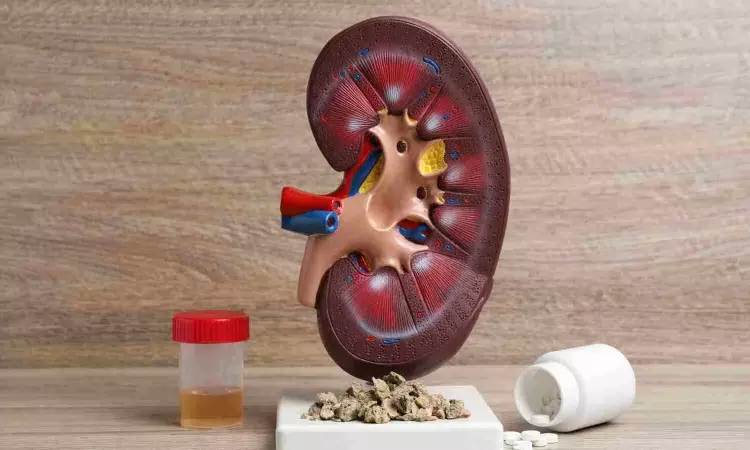- Home
- Medical news & Guidelines
- Anesthesiology
- Cardiology and CTVS
- Critical Care
- Dentistry
- Dermatology
- Diabetes and Endocrinology
- ENT
- Gastroenterology
- Medicine
- Nephrology
- Neurology
- Obstretics-Gynaecology
- Oncology
- Ophthalmology
- Orthopaedics
- Pediatrics-Neonatology
- Psychiatry
- Pulmonology
- Radiology
- Surgery
- Urology
- Laboratory Medicine
- Diet
- Nursing
- Paramedical
- Physiotherapy
- Health news
- Fact Check
- Bone Health Fact Check
- Brain Health Fact Check
- Cancer Related Fact Check
- Child Care Fact Check
- Dental and oral health fact check
- Diabetes and metabolic health fact check
- Diet and Nutrition Fact Check
- Eye and ENT Care Fact Check
- Fitness fact check
- Gut health fact check
- Heart health fact check
- Kidney health fact check
- Medical education fact check
- Men's health fact check
- Respiratory fact check
- Skin and hair care fact check
- Vaccine and Immunization fact check
- Women's health fact check
- AYUSH
- State News
- Andaman and Nicobar Islands
- Andhra Pradesh
- Arunachal Pradesh
- Assam
- Bihar
- Chandigarh
- Chattisgarh
- Dadra and Nagar Haveli
- Daman and Diu
- Delhi
- Goa
- Gujarat
- Haryana
- Himachal Pradesh
- Jammu & Kashmir
- Jharkhand
- Karnataka
- Kerala
- Ladakh
- Lakshadweep
- Madhya Pradesh
- Maharashtra
- Manipur
- Meghalaya
- Mizoram
- Nagaland
- Odisha
- Puducherry
- Punjab
- Rajasthan
- Sikkim
- Tamil Nadu
- Telangana
- Tripura
- Uttar Pradesh
- Uttrakhand
- West Bengal
- Medical Education
- Industry
Kidney stones not independently linked to chronic kidney disease, suggests study

A new study published in the Journal of American Society of Nephrology found that kidney stones were not independently linked to chronic kidney disease (CKD). Around 5 and 13% of adults suffer from kidney stones and chronic kidney disease, respectively. Renal crystal deposition, or nephrocalcinosis, can cause progressive loss of GFR and end-stage renal disease (ESRD) at a young age. Rare inherited illnesses such as primary hyperoxaluria, 2-8-hydroxyadenine crystalluria, Dent disease, and cystinuria can cause CKD which is a documented consequence of kidney stones.
Kidney stones may be a contributing factor in the development and progression of CKD even though the incidence of ESRD directly linked to kidney stones is estimated to be 3.2% among patients starting continuous hemodialysis. The precise association between previous kidney stones and increased CKD risk is yet unknown, despite observational studies suggesting such a possibility. Therefore, Zhou LT and team conducted this study to find out the intricate relationship between kidney stones and CKD.
Unbiased screening was employed to find shared comorbidities between two illnesses. Genetic association studies across a range of variables were conducted after obtaining genome-wide association study summary results from the UK Biobank (UKBB), CKDGen, and FinnGen. To identify causal relationships, bidirectional Mendelian randomization (MR) studies were carried out. Multivariable MR was also employed, which encompassed the common comorbidities such as obesity, diabetes, and hypertension. Using a UKBB subgroup and cohorts from the Mayo Clinic, observational analyses were conducted.
There was not a significant genetic association found between kidney stones and chronic kidney disease (CKD), despite the identification of 123 illnesses as shared comorbidities. Kidney stones and the risk of CKD were not significantly correlated, according to an unadjusted MR analysis. Although there was a significant correlation between kidney stones and a higher urine albumin-creatinine ratio (UACR), this correlation vanished in the multivariable MR model. Moreover, a robust regression model did not find an independent link between kidney stones and UACR or eGFR in a cross-sectional study restricted to the UKBB sample.
However, in multivariable MR models, CKD was linked to a lower the incidence of renal stones. Additionally, decreased eGFR was linked to reduced urine calcium excretion and urinary calcium oxalate/phosphate supersaturation in the Mayo Clinic cohort with accessible urinary biochemistries. Overall, kidney stones and CKD were not shown to be correlated in this study. On the other hand, CKD was linked to a lower incidence of kidney stones made of calcium, most likely as a result of altered vital signs of the urine, such as decreased excretion of calcium.
Reference:
Zhou, L.-T., Ali, A. E., Jayachandran, M., Haskic, Z., Harris, P. C., Rule, A. D., Koo, K., McDonnell, S. K., Larson, N. B., & Lieske, J. C. (2024). Association between Kidney Stones and CKD. In Journal of the American Society of Nephrology. Ovid Technologies (Wolters Kluwer Health). https://doi.org/10.1681/asn.0000000000000453
Neuroscience Masters graduate
Jacinthlyn Sylvia, a Neuroscience Master's graduate from Chennai has worked extensively in deciphering the neurobiology of cognition and motor control in aging. She also has spread-out exposure to Neurosurgery from her Bachelor’s. She is currently involved in active Neuro-Oncology research. She is an upcoming neuroscientist with a fiery passion for writing. Her news cover at Medical Dialogues feature recent discoveries and updates from the healthcare and biomedical research fields. She can be reached at editorial@medicaldialogues.in
Dr Kamal Kant Kohli-MBBS, DTCD- a chest specialist with more than 30 years of practice and a flair for writing clinical articles, Dr Kamal Kant Kohli joined Medical Dialogues as a Chief Editor of Medical News. Besides writing articles, as an editor, he proofreads and verifies all the medical content published on Medical Dialogues including those coming from journals, studies,medical conferences,guidelines etc. Email: drkohli@medicaldialogues.in. Contact no. 011-43720751


